- Español NEW

Pelé facts for kids
- Senior club appearances and goals counted for the domestic league only.
Edson Arantes do Nascimento ( 23 October 1940 – 29 December 2022), known as Pelé , was a Brazilian professional footballer . He played as a forward . Pelé is regarded as one of the greatest players of all time and labelled "the greatest" by FIFA . He was among the most successful and popular sports figures of the 20th century. In 1999, he was named Athlete of the Century by the International Olympic Committee and was included in the Time list of the 100 most important people of the 20th century.
He scored 1,279 goals in 1,363 games, and this achievement is recognised as a Guinness World Record .
In 2000, Pelé was voted World Player of the Century by the International Federation of Football History & Statistics (IFFHS) and was one of the two joint winners of the FIFA Player of the Century.
Early years
First steps in football.
New York Cosmos
International career
Style of play, relationships and children, public image, international, filmography.
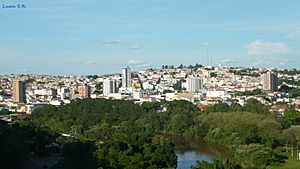
Pelé was born Edson Arantes do Nascimento on 23 October 1940, in Três Corações, Minas Gerais, Brazil, to a family of Fluminense footballer Dondinho (born João Ramos do Nascimento) and Celeste Arantes. He was the elder of two siblings, and was named after the American inventor Thomas Edison . His parents decided to remove the "i" and call him "Edson", but there was a mistake on the birth certificate, and in many documents his name appeared as "Edison", not "Edson", as he is called.
He was originally nicknamed "Dico" by his family. He received the nickname "Pelé" during his school days. He was given it because he mispoke the name of his favourite player, local Vasco da Gama goalkeeper Bilé. In his autobiography, Pelé stated he had no idea what the name means, nor did his old friends. Apart from the assertion that the name is derived from that of "Bilé", and that it is Hebrew for "miracle" (פֶּ֫לֶא), the word has no known meaning in Portuguese .
Pelé grew up in poverty in Bauru in the state of São Paulo . He earned extra money by working in tea shops as a servant.
Pelé was taught to play by his father. As his family was poor, he could not afford a proper football and usually played with either a sock stuffed with newspaper and tied with string, or a grapefruit. He played for several amateur teams in his youth, including Sete de Setembro , Canto do Rio , São Paulinho , and Amériquinha .
Pelé led Bauru Athletic Club juniors (coached by Waldemar de Brito ) to two São Paulo state youth championships. In his mid-teens, he played for an indoor football team called Radium. Indoor football had just become popular in Bauru when Pelé began playing it. He was part of the first futsal (indoor football) competition in the region. Pelé and his team won the first championship and several others.
According to Pelé, futsal (indoor football) presented difficult challenges; he said it was a lot quicker than football on the grass and that players were required to think faster because everyone is close to each other in the pitch. Pelé credits futsal for helping him think better on the spot. In addition, futsal allowed him to play with adults when he was about 14 years old. In one of the tournaments he participated in, he was initially considered too young to play, but eventually went on to end up top scorer with 14 or 15 goals. "That gave me a lot of confidence", Pelé said, "I knew then not to be afraid of whatever might come".

Club career
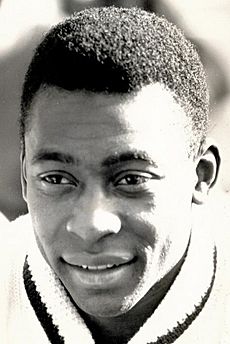
Pelé began playing for Santos at age 15 and the Brazil national team at 16.
He is Santos' all-time top goalscorer with 643 goals in 659 games. In a golden era for Santos, he led the club to the 1962 and 1963 Copa Libertadores, and to the 1962 and 1963 Intercontinental Cup.
Pelé states that his most memorable goal was scored at the Estádio Rua Javari on a Campeonato Paulista match against São Paulo rival Clube Atlético Juventus on 2 August 1959. As there is no video footage of this match, Pelé asked that a computer animation be made of this specific goal.
In March 1961, Pelé scored the gol de placa (goal worthy of a plaque), against Fluminense at the Maracanã. Pelé received the ball on the edge of his own penalty area, and ran the length of the field, eluding opposition players with feints, before striking the ball beyond the goalkeeper. A plaque was commissioned with a dedication to "the most beautiful goal in the history of the Maracanã".
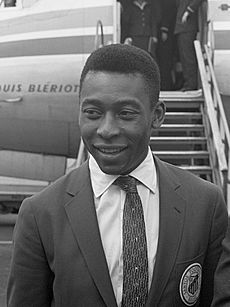
In 1969, the two factions involved in the Nigerian Civil War agreed to a 48-hour ceasefire so they could watch Pelé play an exhibition game in Lagos . Santos ended up playing to a 2–2 draw with Lagos side Stationary Stores FC and Pelé scored his team's goals. The civil war went on for one more year after this game.
During his time at Santos, Pelé played alongside many gifted players, including Zito, Pepe , and Coutinho; the latter partnered him in numerous one-two plays, attacks, and goals. Pelé's 643 goals for Santos was the most goals scored for a single club until it was surpassed by Lionel Messi of Barcelona in December 2020.
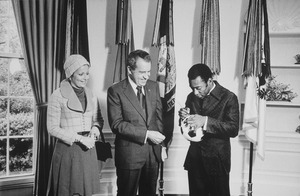
After the 1974 season (his 19th with Santos), Pelé retired from Brazilian club football although he continued to occasionally play for Santos in official competitive matches. A year later, he signed with the New York Cosmos of the North American Soccer League (NASL) for the 1975 season.
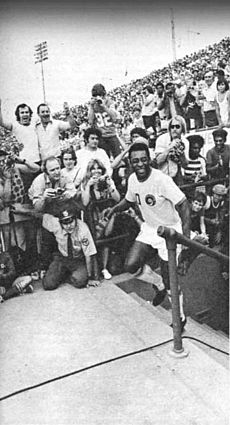
Pelé made his debut for the Cosmos on 15 June 1975 against the Dallas Tornado at Downing Stadium, scoring one goal in a 2–2 draw. Pelé opened the door for many other stars to play in North America.
Pelé led the Cosmos to the 1977 Soccer Bowl, in his third and final season with the club.
On 1 October 1977, Pelé closed out his career in an exhibition match between the Cosmos and Santos. The match was played in front of a sold-out crowd at Giants Stadium and was televised in the US on ABC's Wide World of Sports as well as throughout the world. Pelé's father and wife both attended the match, as well as Muhammad Ali and Bobby Moore.
Pelé played the first half with the Cosmos, the second with Santos. The game ended with the Cosmos winning 2–1, with Pelé scoring with a 30-yard free-kick for the Cosmos in what was the final goal of his career. During the second half it started to rain, prompting a Brazilian newspaper to come out with the headline the following day: "Even The Sky Was Crying."
Pelé's first international match was a 2–1 defeat against Argentina on 7 July 1957 at the Maracanã. In that match, he scored his first goal for Brazil aged 16 years and nine months, and he remains the youngest goalscorer for his country.
During his international career, he won three FIFA World Cups : 1958 , 1962 and 1970 , the only player to do so. He was nicknamed O Rei (The King) following the 1958 tournament.
Pelé is the joint-top goalscorer for Brazil with 77 goals in 92 games.
Pelé's last international match was on 18 July 1971 against Yugoslavia in Rio de Janeiro. With Pelé on the field, the Brazilian team's record was 67 wins, 14 draws and 11 losses. Brazil never lost a match while fielding both Pelé and Garrincha.
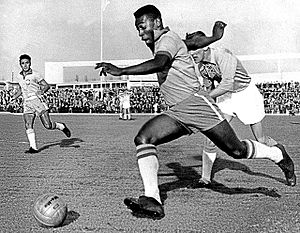
Pelé has also been known for connecting the phrase "The Beautiful Game" with football. He was known for his ability to anticipate opponents in the area and finish off chances with an accurate and powerful shot with either foot. Pelé was also a hard-working team player, and a complete forward, with exceptional vision and intelligence, who was recognised for his precise passing and ability to link up with teammates and provide them with assists .
In his early career, he played in a variety of attacking positions . Although he usually operated inside the penalty area as a main striker or centre forward , his wide range of skills also allowed him to play in a more withdrawn role, as an inside forward or second striker , or out wide . In his later career, he took on more of a deeper playmaking role behind the strikers, often functioning as an attacking midfielder . Pelé's unique playing style combined speed, creativity, and technical skill with physical power, stamina, and athleticism. His excellent technique, balance, flair, agility, and dribbling skills enabled him to beat opponents with the ball, and frequently saw him use sudden changes of direction and elaborate feints in order to get past players, such as his trademark move, the drible da vaca . Another one of his signature moves was the paradinha , or little stop.
Despite his relatively small stature, 1.73 metres (5 ft 8 in), he excelled in the air, due to his heading accuracy, timing, and elevation. Renowned for his bending shots, he was also an accurate free-kick taker, and penalty taker, although he often refrained from taking penalties, stating that he believed it to be a cowardly way to score.
Pelé was also known to be a fair and highly influential player, who stood out for his charismatic leadership and sportsmanship on the pitch. His warm embrace of Bobby Moore following the Brazil vs England game at the 1970 World Cup is viewed as the embodiment of sportsmanship, with The New York Times stating the image "captured the respect that two great players had for each other. As they exchanged jerseys, touches and looks, the sportsmanship between them is all in the image. No gloating, no fist-pumping from Pelé. No despair, no defeatism from Bobby Moore." Pelé also earned a reputation for often being a decisive player for his teams, due to his tendency to score crucial goals in important matches.
Personal life
- Sandra (1964–2006)
- Flávia (born 1968)
- Kelly Cristina (born 1967)
- Edson (born 1970)
- Jennifer (born 1978)
- Joshua (born 1996)
- Celeste (born 1996)
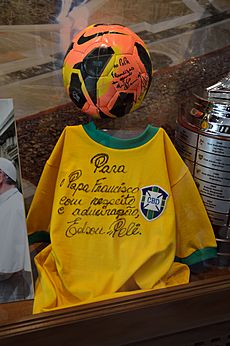
Pelé married three times, and had several affairs, producing several children.
On 21 February 1966, Pelé married Rosemeri dos Reis Cholbi. They had two daughters and one son: Kelly Cristina (born 13 January 1967), who married Dr. Arthur DeLuca, Jennifer (b. 1978), and their son Edson ("Edinho", b. 27 August 1970). The couple divorced in 1982.
In April 1994, Pelé married psychologist and gospel singer Assíria Lemos Seixas, who gave birth on 28 September 1996 to twins Joshua and Celeste through fertility treatments. The couple divorced in 2008.
Pelé had at least two more children from former affairs. Sandra Machado, who was born from an affair Pelé had in 1964 with a housemaid, Anizia Machado, fought for years to be acknowledged by Pelé, who refused to submit to DNA tests. Pelé finally relented after a court-ordered DNA test proved she was his daughter; Machado died of cancer in 2006.
At the age of 73, Pelé announced his intention to marry 41-year-old Marcia Aoki, a Japanese-Brazilian importer of medical equipment from Penápolis, São Paulo, whom he had been dating from 2010. They first met in the mid-1980s in New York, before meeting again in 2008. They married in July 2016.
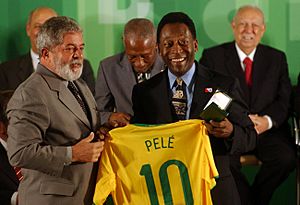
In 1970, Pelé was investigated by the Brazilian military dictatorship for suspected leftist sympathies. Declassified documents showed Pelé was investigated after being handed a manifesto calling for the release of political prisoners. Pelé himself did not get further involved within political struggles in the country.
In 1976, Pelé was on a Pepsi -sponsored trip in Lagos, Nigeria, when that year's attempted military coup took place. Pelé was trapped in a hotel together with Arthur Ashe and other tennis pros, who were participating in the interrupted 1976 Lagos WCT tournament. Pelé and his crew eventually left the hotel to stay at the residence of Brazil's ambassador as they could not leave the country for a couple of days. Later the airport was opened and Pelé left the country disguised as a pilot.
In June 2013, he was criticised in public opinion for his conservative views. During the 2013 protests in Brazil, Pelé asked for people to "forget the demonstrations" and support the Brazil national team.
A practicing Catholic , Pelé donated a signed jersey to Pope Francis . Accompanied with a signed football from Ronaldo , it is located in one of the Vatican Museums .
Pelé was known for frequently referring to himself in the third person.
In Brazil, he is hailed as a national hero for his accomplishments in football and for his outspoken support of policies that improve the social conditions of the poor. His emergence at the 1958 World Cup, where he became the first black global sporting star, was a source of inspiration.
On December 29, 2022, Pelé died at the age of 82 in Sao Paulo, Brazil. His agent Joe Fraga confirmed his death. Pelé had been undergoing treatment for colon cancer since 2021 and had been hospitalized for the last month with multiple ailments.
After football
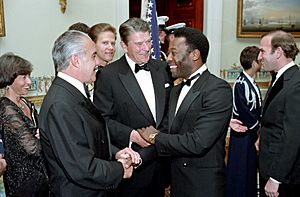
Throughout his career and in his retirement, Pelé received several individual and team awards for his performance in the field, his record-breaking achievements, and legacy in the sport. Since retiring in 1977, Pelé was a worldwide ambassador for football and made many acting and commercial ventures. In 2010, he was named the honorary president of the New York Cosmos.
In 1994, Pelé was appointed a UNESCO Goodwill Ambassador.
In 1995, Brazilian President Fernando Henrique Cardoso appointed Pelé to the position of Extraordinary Minister for Sport. During this time he proposed legislation to reduce corruption in Brazilian football, which became known as the "Pelé law." The Brazilian President had eliminated the post of Sports Minister in 1998.
In 1997, he received an honorary knighthood from Queen Elizabeth II at a ceremony in Buckingham Palace . Pelé also helped inaugurate the 2006 FIFA World Cup finals, alongside supermodel Claudia Schiffer .
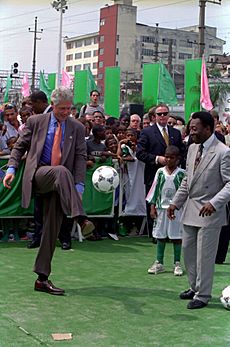
The most notable area of Pelé's life since football was his ambassadorial work. In 1992, he was appointed a UN ambassador for ecology and the environment. He was also awarded Brazil's gold medal for outstanding services to the sport in 1995.
In 2012, Pelé was awarded an honorary degree from the University of Edinburgh for "significant contribution to humanitarian and environmental causes, as well as his sporting achievements".
In 2009, Pelé assisted the Rio de Janeiro bid for the 2016 Summer Olympics. In July 2009 he spearheaded the Rio 2016 presentation to the Association of National Olympic Committees of Africa General Assembly in Abuja, Nigeria.
On 12 August 2012, Pelé was an attendee at the 2012 Olympic hunger summit hosted by UK Prime Minister David Cameron at 10 Downing Street , London, part of a series of international efforts which have sought to respond to the return of hunger as a high-profile global issue. Later on the same day, Pelé appeared at the closing ceremony of the 2012 Summer Olympics in London, following the handover section to the next host city for the 2016 Summer Olympics , Rio de Janeiro. In addition to his ambassadorial work, Pelé supported various charitable causes, such as Action for Brazil's Children, Gols Pela Vida, SOS Children's Villages, The Littlest Lamb, Prince's Rainforests Project and many more. In 2016, Pelé auctioned more than 1600 items from a collection he accumulated over decades and raised £3.6 million for charity. In 2018, Pelé founded his own charitable organisation, the Pelé Foundation, which endeavours to empower impoverished and disenfranchised children from around the globe.
Pelé has published several autobiographies, starred in documentary films, and composed musical pieces, including the soundtrack for the film Pelé in 1977.
He appeared in the 1981 film Escape to Victory , about a World War II -era football match between Allied prisoners of war and a German team. Pelé starred alongside other footballers of the 1960s and 1970s, with actors Michael Caine and Sylvester Stallone .
In 1969, Pelé starred in a telenovela called Os Estranhos , about first contact with aliens. It was created to drum up interest in the Apollo missions .
In 2001, had a cameo role in the satire film Mike Bassett: England Manager . Pelé was asked to participate in the 2006 ESPN documentary film Once in a Lifetime: The Extraordinary Story of the New York Cosmos , but declined when the producers refused to pay his requested $100,000 fee.
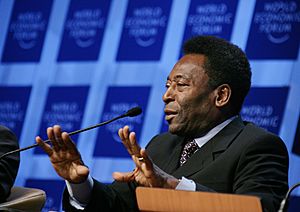
- Campeonato Brasileiro Série A : 1961, 1962, 1963, 1964, 1965, 1968
- Copa Libertadores : 1962, 1963
- Intercontinental Cup : 1962, 1963
- Intercontinental Supercup: 1968
- Campeonato Paulista: 1958, 1960, 1961, 1962, 1964, 1965, 1967, 1968, 1969, 1973
- Torneio Rio-São Paulo: 1959, 1963, 1964, 1966
- North American Soccer League , Soccer Bowl: 1977
- North American Soccer League , Atlantic Conference Championship: 1977
- FIFA World Cup : 1958 , 1962 , 1970
- Taça do Atlântico: 1960
- Roca Cup: 1957, 1963
- Taça Oswaldo Cruz: 1958, 1962, 1968
- Copa Bernardo O'Higgins: 1959
In December 2000, Pelé and Maradona shared the prize of FIFA Player of the Century by FIFA . The award was originally intended to be based upon votes in a web poll, but after it became apparent that it favoured Diego Maradona , many observers complained that the Internet nature of the poll would have meant a skewed demographic of younger fans who would have seen Maradona play, but not Pelé. FIFA then appointed a "Family of Football" committee of FIFA members to decide the winner of the award together with the votes of the readers of the FIFA magazine. The committee chose Pelé. Since Maradona was winning the Internet poll, however, it was decided he and Pelé should share the award.
- Campeonato Paulista Top Scorer: 1957, 1958, 1959, 1960, 1961, 1962, 1963, 1964, 1965, 1969, 1973
- FIFA World Cup Best Young Player: 1958
- FIFA World Cup Silver Ball: 1958
- France Football's Ballon d'Or : 1958, 1959, 1960, 1961, 1963, 1964, 1970 – Le nouveau palmarès (the new winners)
- South American Championship Best Player: 1959
- South American Championship Top Scorer: 1959
- Gol de Placa: 1961
- Campeonato Brasileiro Série A Top Scorer: 1961, 1963, 1964
- Intercontinental Cup Top Scorer: 1962, 1963
- Torneio Rio-São Paulo Top Scorer: 1963
- Copa Libertadores Top Scorer: 1965
- BBC Overseas Sports Personality of the Year: 1970
- Bola de Prata: 1970
- FIFA World Cup Golden Ball (Best Player): 1970
- South American Footballer of the Year: 1973
- Included in the North American Soccer League (NASL) All-Star team: 1975, 1976, 1977
- NASL Top Assist Provider: 1976
- NASL Most Valuable Player : 1976
- Number 10 retired by the New York Cosmos as a recognition to his contribution to the club: 1977
- Elected Citizen of the World, by the United Nations : 1977
- International Peace Award: 1978
- FIFA Order of Merit: 1984
- Inducted into the American National Soccer Hall of Fame : 1992
- Elected Goodwill Ambassador, by UNESCO : 1993
- Winner of France Football's World Cup Top-100 1930–1990: 1994
- Marca Leyenda: 1997
- World Team of the 20th Century: 1998
- Football Player of the Century, elected by France Football's Ballon d'Or Winners: 1999
- TIME : One of the 100 Most Important People of the 20th century: 1999
- Greatest Player of the 20th Century, by World Soccer: 1999
- Athlete of the Century, by Reuters News Agency: 1999
- Athlete of the Century, elected by International Olympic Committee : 1999
- World Player of the Century, by the IFFHS: 2000
- South American player of the century, by the IFFHS: 2000
- FIFA Player of the Century: 2000
- Laureus Lifetime Achievement Award: 2000
- FIFA Centennial Award: 2004
- FIFA 100 Greatest Living Footballers: 2004
- BBC Sports Personality of the Year Lifetime Achievement Award : 2005
- Elected best Brazilian player of the century, by the IFFHS: 2006
- Greatest football player to have ever played the game, by Golden Foot: 2012
- FIFA Ballon d'Or Prix d'Honneur: 2013
- World Soccer Greatest XI of All Time: 2013
- Legends of Football Award: 2013
- South America's Best Player in History, by L’Équipe: 2015
- Inspiration Award, by GQ: 2017
- Global Citizen Award, by the World Economic Forum : 2018
- FWA Tribute Award: 2018
- Ballon d'Or Dream Team : 2020
- IFFHS All-time Men's Dream Team: 2021
- IFFHS South America Men's Team of All Time: 2021
- Knight of the Order of Rio Branco: 1967
- Elected Commander of the Order of Rio Branco after scoring the thousandth goal: 1969
- Awarded with the Order of Champions, by the Organization of Catholic Youth in the USA: 1978
- Awarded the FIFA Order as a tribute to his 80 years as a sports institution: 1984
- Awarded with the Order of Merit of South America, by CONMEBOL: 1984
- He was awarded the National Order of Merit, by the government of Brazil: 1991
- Awarded with the Cross of the Order of the Republic of Hungary: 1994
- Knight Commander of the Order of the British Empire (honorary knighthood): 1997
- Olympic Order, by the International Olympic Committee : 2016
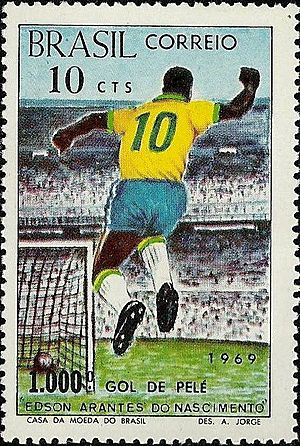
- Joint-most goals for Brazil national football team : 77 (95 including unofficial friendlies) (tied with Neymar )
- Highest goals-per-game ratio (0.84) for Brazil national football team
- Highest goals-per-game ratio (0.84) of any South American top international scorer
- Highest goals-per-game ratio (2.33) of any leading scorer in the Intercontinental Cup
- Most goals in the Intercontinental Cup : 7
- Most goals for Santos : 643 (in 659 competitive games)
- Most goals scored in a single Campeonato Paulista season: 58 (in 38 competitive games,1958)
- Most goals in a calendar year (recognised by FIFA ): 127 (1959)
- Most hat-tricks in world football: 92
- Most career goals in world football (including friendlies): 1,283 (in 1,363 games)
- Most FIFA World Cup winners' medals: 3 ( 1958 , 1962 , 1970 )
- Youngest winner of a FIFA World Cup: aged 17 years and 249 days (1958)
- Youngest goalscorer in a FIFA World Cup: aged 17 years and 239 days (for Brazil vs Wales , 1958)
- Youngest player to score twice in a FIFA World Cup semi-final: aged 17 years and 244 days (for Brazil vs France , 1958)
- Youngest player to score a hat-trick in a FIFA World Cup: aged 17 years and 244 days (for Brazil vs France, 1958)
- Youngest player to play in a FIFA World Cup Final : aged 17 years and 249 days (1958)
- Youngest goalscorer in a FIFA World Cup Final: aged 17 years and 249 days (for Brazil vs Sweden , 1958)
- Youngest player to score twice in a FIFA World Cup Final: aged 17 years and 249 days (for Brazil vs Sweden, 1958)
- Youngest player to start a knockout match at a FIFA World Cup
- Youngest player to reach five FIFA World Cup knockout stage goals
- Youngest goalscorer for Brazil national football team: aged 16 years and nine months (Brazil vs Argentina , 1957)
- First player to score in three successive FIFA World Cups
- One of only five players to have scored in four different FIFA World Cup tournaments
- One of only five players to have scored in two different FIFA World Cup Finals
- Scored in two FIFA World Cup Finals for winning teams (shared with Vavá )
- Most assists provided in FIFA World Cup history: 10 (1958–1970)
- Most assists provided in a single FIFA World Cup tournament: 6 (1970)
- Most assists provided in FIFA World Cup Final matches: 3 (1 in 1958 and 2 in 1970)
- Most assists provided in FIFA World Cup knockout phase: 6 (shared with Messi )
- Most goals from open play in FIFA World Cup Final matches: 3 (2 in 1958 and 1 in 1970) (shared with Vavá , Geoff Hurst and Zinedine Zidane )
- Only player to reach 25 international goals as a teenager
- Only player to score in a FIFA World Cup before turning 18
- Only player to score a hat-trick in a FIFA World cup before turning 18
- Only player to have scored a hat-trick in the Intercontinental Cup
Career statistics
Pelé's goalscoring record is often reported by FIFA as being 1,281 goals in 1,363 games. This figure includes goals scored by Pelé in friendly club matches, including international tours Pelé completed with Santos and the New York Cosmos, and a few games Pelé played in for the Brazilian armed forces teams during his national service in Brazil and the Selection Team of São Paulo State for the Brazilian Championship of States ( Campeonato Brasileiro de Seleções Estaduais ). He was listed in the Guinness World Records for most career goals scored in football. In 2000, IFFHS declared Pelé as the "World's Best and successful Top Division Goal Scorer of all time" with 541 goals in 560 games and honoured him with a trophy.
The tables below record every goal Pelé scored in official club competitions for Santos FC and all matches and goals for the New York Cosmos.
- * Indicates that the number was deduced from the list of rsssf.com and this list of Pelé games.
With 77 goals in 92 official appearances, Pelé is the joint-top scorer of the Brazil national football team (tied with Neymar ). He scored 12 goals and is credited with 10 assists in 14 World Cup appearances, including 4 goals and 7 assists in 1970 . Pelé shares with Uwe Seeler , Miroslav Klose , Lionel Messi and Cristiano Ronaldo , the achievement of being the only players to have scored in four separate World Cup tournaments.
Pelé's statistics of goals and appearances differ between sources mostly due to friendly games. The RSSSF states that Pelé scored 775 goals in 840 official games. The following table is based on the latest announcement of RSSSF (2021).
- This page was last modified on 14 November 2024, at 03:20. Suggest an edit .

IMAGES
VIDEO